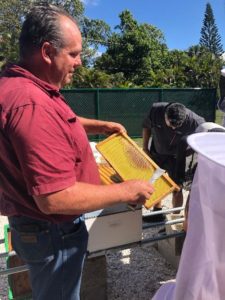July 24, 2019
Celebrate National Honey Bee Day at Edison and Ford Winter Estates

B. Keith Councell from Councell Farms examines honey bee hives at Edison and Ford Winter Estates.
FORT MYERS, Fla. (July 24, 2019) — In celebration of National Honey Bee Day on August 17, the public is invited to learn about bees and native plants for pollinators at Edison and Ford Winter Estates (EFWE). The day’s itinerary includes a live honey extraction demonstration, a honey bee lecture by David Westervelt with the Florida State Beekeepers Association, and Tony Mauriello and Kara Tyler-Julian from the Coccoloba Chapter of the Florida Native Plant Society will give a presentation on Florida native plants for pollinators.
Additionally, there will be local honey available for sale and tasting; a question and answer session with bee inspector, Freddy Howard; and informational tables with guests from the Florida Native Plant Society, Florida State Beekeepers Association, and Solitary Bee Homes. Florida native and other pollinator plants will be available for purchase.
Presentation Schedule:
- 9 a.m. Hands-on honey bee presentation
- 9:30 a.m. Honey extraction demonstration
- 11 a.m. Lecture by David Westervelt, Florida State Beekeepers Association Coordinator
- 12 p.m. Presentation on native plants for pollinators by Florida Naturalist, Tony Mauriello and Entomologist, Kara Tyler-Julian from the Florida Native Plant Society
- 9 a.m. – 2 p.m. Information tables and Florida native and pollinator plants available for sale
There are currently more than a dozen honey bee hives managed by professional beekeepers at EFWE. Historically, bees were critical to the site for pollination. As early as 1886, Edison instructed his caretaker to obtain bee hives to pollinate flowers and other plants on his property.
In addition to honey bees, there are more than 4,000 native bee species in North America; more than 300 of those are found in Florida, and of those, 29 are endemic (found only in Florida). Due to pesticide use, disease and parasites, bee populations have decreased considerably. Across the United States, some native bee species have recently been added to the endangered list, such as the rusty-patched bumblebee, Bombus affinis, and seven species of the Hawaiian yellow-faced bees.
Approximately one third of the food that humans consume each day requires pollination, including fruits, vegetables, nuts and other crops. Bees are also the primary pollinator for many beautiful flowers that grow wild and are used in landscaping.
“This is an opportunity for residents to learn about the important role bees play in our environment and how everyone can help protect honey bees and the many Florida native bees in their own home gardens,” said Debbie Hughes, horticulture director at EFWE.
The event is free (does not include tours, museum or lab) and will run from 9 a.m. to 2 p.m. For more information, visit the website or call 239-334-7419.
